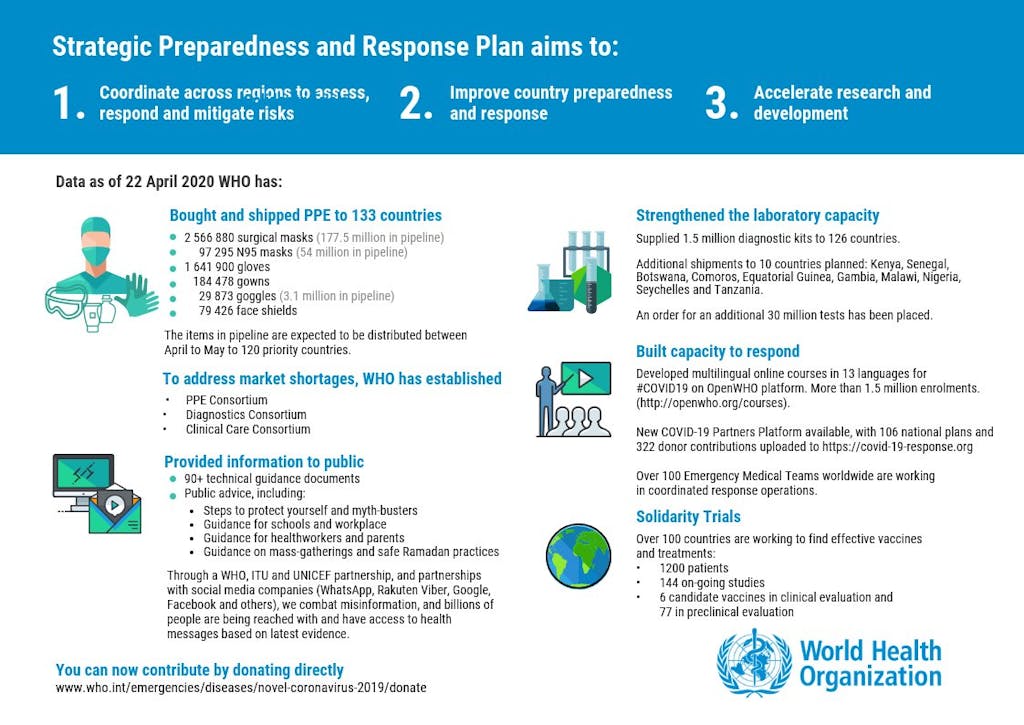The search for a COVID-19 vaccine has united the planet’s scientific and medical communities in unprecedented ways.
Dr. Purvi Parikh is part of this international community — and says the World Health Organization (WHO) serves a vital role in connecting and coordinating such a massive global pandemic response.
“We have the challenge of treating this virus and learning about it at the same time,” the New York immunologist told me recently from the epicenter of the U.S. outbreak.
“Every country has their own contingency plan, but we need one unifying body to take in data and collect on-the-ground reports from everywhere. That’s how we learn — especially with a brand new virus that none of us have ever seen before.”
“So WHO’s work is extremely important in not only educating the medical community, but also helping coordinate responses around the world and reporting back to us what works and what doesn’t.”
A UNITED FRONT
WHO is leading global efforts to fight COVID-19. Their response encompasses all parts of the UN system, including major agencies like UNICEF and the World Food Programme (WFP), as well as public and private sector partners. This work is happening on two key fronts: Equipping frontline health workers all over the world, and accelerating collaborative efforts to find a vaccine and effective treatments for all who need them.

Right now WFP is operating flights to deliver WHO supplies across the globe. As of April 22nd, WHO has shipped more than 2.5 million surgical masks, 1.6 million gloves, and other personal protective equipment to more than 125 countries. The agency has also developed diagnostic tools that are being used all over the world, and distributed more than 1.5 million testing kits to more than 136 countries.
At the same time, UNICEF is helping stop the spread by making sure vulnerable families have access to water, sanitation, and hygiene.
Donations to the COVID-19 Solidarity Response Fund are facilitating all aspects of this global strategy, coordinated through WHO. Donations are also helping WHO set up and lead an international Supply Chain Task Force, bringing together companies and government agencies together to ensure an effective global supply of critical commodities — including personal protective equipment, as well as skilled personnel. Many global companies are repurposing factories to help this effort.
This is the kind of solidarity the world needs across countries, communities and sectors to defeat the pandemic.
Since January, WHO has also been working with thousands of researchers across the planet to speed up and track vaccine research, including developing animal models, clinical trial designs, and disseminating the latest data among the global scientific community. WHO is also coordinating a global trial on the safety and efficacy of four therapeutic treatments for COVID-19.
Last week, WHO leaders joined world leaders including French President Emmanuel Macron, EU President Ursula von der Leyen and philanthropists Bill and Melinda Gates to co-host the launch of the Access to COVID-19 Tools (ACT) Accelerator to ensure that all countries have access to the technology, treatments, and tools necessary to stop the spread.
“The resolve and sacrifice of frontline health workers must be matched by every individual and every political leader,” WHO General Director Dr. Tedros Ghebreyesus recently declared in outlining the agency’s global pandemic response. “It requires a whole-of-government and whole-of-society response.”
“We’re all in this together — and we will only succeed together.”
WHY VACCINES ARE VITAL
As this virus has made all too clear, vaccines are crucial to the world’s well-being. COVID-19 has already claimed the lives of more than 210,000 people since its discovery less than six months ago. The U.S. is now leading the planet in COVID-19 casualties with one-quarter of all deaths worldwide.
Few realms of our lives remain untouched by the virus’s reach — including access to vaccines. Earlier this month, WHO warned that COVID-19 is putting an estimated 117 million children worldwide at risk of missing the measles vaccine due to a lack of access because of the virus.
“Now is definitely not the time for millions of people to lose access to existing vaccines because we cannot afford multiple infectious disease outbreaks,” New York City immunologist Dr. Puri Parikh recently told me. “None of our global health systems have the bandwidth for that right now.”
This week we’re highlighting voices like hers as part of World Immunization Week, an annual opportunity to celebrate the scientific achievement that vaccines represent and the millions of lives saved as a result — and to ensure their access for everyone.
Dr. Parikh is one of more than 350,000 people in all 50 states of the U.S. who support the UN Foundation’s Shot@Life campaign, a grassroots advocacy group that champions global childhood immunization by supporting the work of UNICEF, WHO, and Gavi, the Vaccine Alliance. These organizations save millions of lives each year by working together on global immunization. In fact, UNICEF vaccinates nearly half of the world’s children.
Right now WHO and the Solidarity Response Fund are supporting the Coalition for Epidemic Preparedness Innovations (CEPI), where eight global partnerships are working simultaneously and collaboratively to develop a COVID-19 vaccine over the next 12-18 months. Two promising vaccines supported by CEPI have already reached the first phase of human trials. A third is just starting human trials in Oxford, in the U.K.
Once viable COVID-19 vaccines are available, WHO, UNICEF and Gavi — along with health workers and community volunteers — will be crucial for equitable distribution and outreach, ensuring no one is left behind.
GLOBAL GIVING
Marshalling resources for this massive global undertaking is why the COVID-19 Solidarity Response Fund exists.
Since its launch in March, the Fund has raised more than $200 million from more than 280,000 individuals and more than 110 companies and organizations to support WHO and key partners in the pandemic response.
We’ve also been treated to amazing displays of creativity and talent in support of WHO’s global pandemic response, including PlayOn Fest, a three-day virtual music festival featuring musicians like Cardi B, Ed Sheeran, and Coldplay. Post Malone also held his own fundraiser with a tribute to Nirvana, Youtuber Mr. Beast contributed and raised funds, and the figuring skating community, including many global Olympians, came together through a live-streamed event, OpenIce Live, raising more than $40,000.
Next week, the UN Foundation will join Giving Tuesday Now on May 5 to mobilize the generosity and support of companies and citizens alike in the fight against COVID-19.
As a founder of Giving Tuesday, we’re calling on all everyone, everywhere to join this global day of giving and unity by:
- GIVING thanks to a health worker or a hero in your life.
- GIVING love to your neighbors, family, and friends.
- GIVING support to the COVID-19 Solidarity Response Fund for WHO.
We’re also joining our partners to support other frontline workers that are too often overlooked: the nonprofits and community organizations feeding, housing, educating, and nurturing neighbors impacted by the global pandemic.
FIRSTHAND ON THE FRONTLINES
“How we put on our protective equipment at the beginning of each shift determines our fate.”
That’s how nurse Laura Lupi describes her experience treating COVID-19 patients at a hospital in northern Italy, an early epicenter of the pandemic.
“I know we can beat this virus; we can fight it together. I want to hear discharged patients say, ‘I have survived COVID-19.’ That is what motivates me and keeps me going.”
You can support WHO’s global pandemic response and frontline health workers like Laura by giving to the COVID-19 Solidarity Response Fund.
Our Fund is the only way to directly support WHO’s global pandemic response — and it’s also the fastest way to get money where it’s needed most.
DONATE TODAY
Every donation makes a difference. Support WHO’s life-saving efforts to respond to the COVID-19 pandemic by giving to the COVID-19 Solidarity Response Fund. Donations made via Facebook will be matched up to $10,000,000. Through June 30, 2020, for every $1 you donate here, Google.org will donate $2, up to $5,000,000.



 View All Blog Posts
View All Blog Posts



